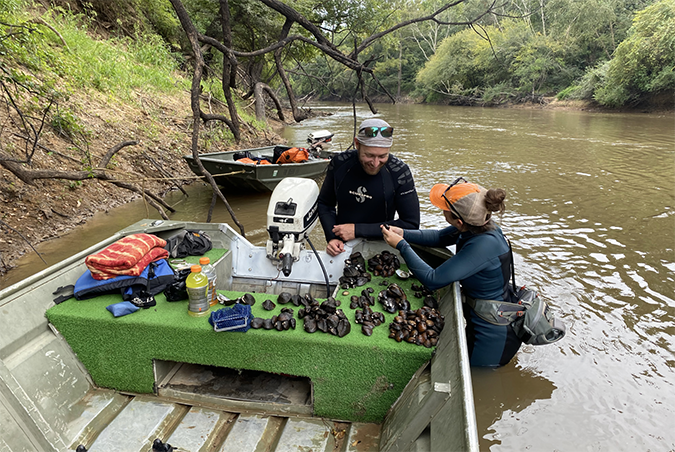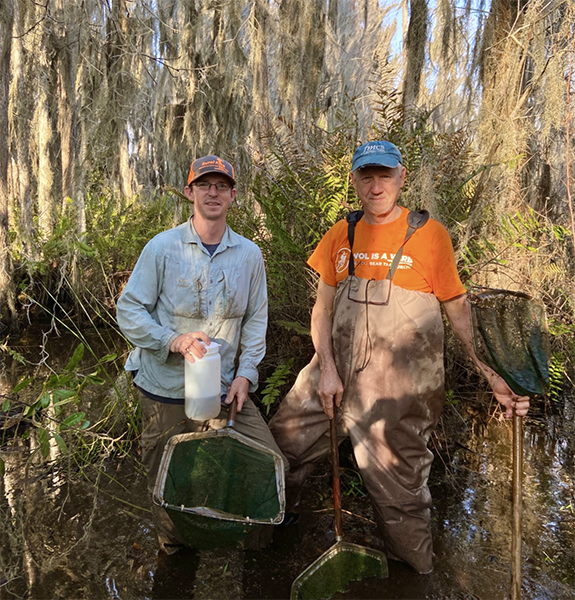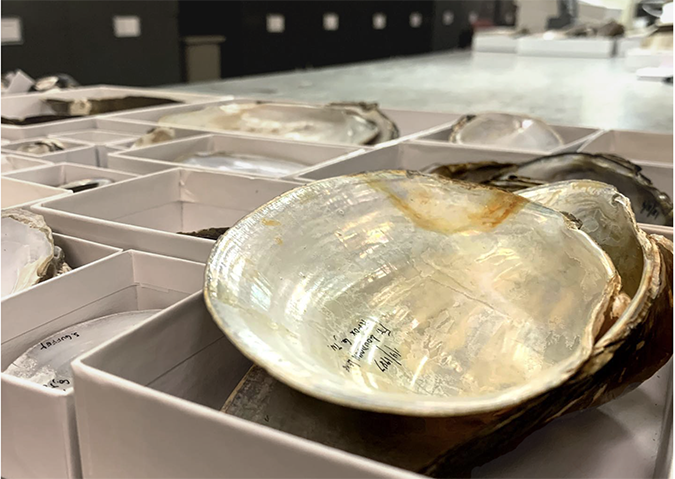| |
McClung Museum launches digital malacology collection
Published July 13, 2023
Empowers scientific collaboration in mollusk research
KNOXVILLE - The McClung Museum of Natural History and Culture at the University of Tennessee, Knoxville (UT) is excited to announce that its extensive malacology (the study of mollusks) collection is now available online. Hosted through the specimen data portal InvertEBase, the launch of this digital collection grants scientists, researchers, and the public access to the museum’s collection, fostering collaboration and enhancing scientific research.

UT School of Natural Resources Dr. Gus Engmann and Brittany Bajo on Bayou Bartholomew collecting mussels in Bayou Bartholomew, the longest bayou in the world; McClung Museum |
Named for former museum director and led by Curator of Malacology Gerald Dinkins, the Paul W. Parmalee Malacological Collection at the McClung Museum is one of the largest on-campus collections in the United States. With more than 300,000 specimens, the collection includes freshwater mussels, aquatic snails, and land snails from around the world, with material dating back to the mid-19th century. It primarily highlights the mussel diversity in Tennessee as the only collection with material from all 95 counties. Tennessee is second only to Alabama as having the most freshwater mussel species in the United States.

Hugh Faust and McClung Museum Curator of Malacooogy Gerald Dickens hold dip nets while conducting research in Florida; McClung Museum |
Since 2018, Dinkins and numerous UT graduate and undergraduate students have worked diligently to inventory and prepare the collection for the InvertEBase format. InvertEBase is a specimen data portal that supports the growing network of natural history collections focused on studying invertebrate animals like mollusks. It provides a platform for institutions, like the McClung Museum, to efficiently manage and share biodiversity data with scientists and the general public.
“This milestone reinforces the museum’s commitment to research and preserve the aquatic biodiversity of our region,” said Dinkins. “Students, educators, researchers, and the general public can now more easily explore these resources to gain a deeper understanding of the natural world and the importance of promoting environmental stewardship.”

Malacological specimen in the Malacology Lab at the McClung Museum of Natural History and Culture; McClung Museum |
Situated along the Tennessee River, UT has played an active role in studying and documenting the biodiversity of the southeastern United States and the McClung Museum’s malacology collection stands as a testament to these efforts. Through contributions from graduate students, state and federal agency biologists, and collaborative researchers, the collection now holds 320 species of freshwater mussels from 42 states and 25 countries, including all 141 currently recognized mussel species that have historically occurred in Tennessee. The collection houses 70 threatened and endangered species and 16 extinct species.
Online accessibility of specimen collections and biodiversity data creates exciting opportunities for collaborative work with other institutions. The McClung Museum’s malacology collection has received specimens from organizations and agencies across the United States, including the U.S. Geological Survey, U.S. Fish and Wildlife Service, National Park Service, U.S. Forest Service, U.S. Army Corps of Engineers, Tennessee Valley Authority, Tennessee Wildlife Resources Agency, several academic institutions, and numerous state agencies from across the U.S.
For more information about the McClung Museum and its digital malacology collection, please visit mcclungmuseum.utk.edu/malacology. To view the online collection, visit invertebase.org.
The McClung Museum of Natural History and Culture is located at 1327 Circle Park Drive. Museum admission is free, and visiting hours are 9 am–5 pm Tuesday–Saturday and 12–4 pm on Sundays. Visitors can register at tiny.utk.edu/visitmcclung and review the visitor guidelines, parking information, and check-in process.
|

